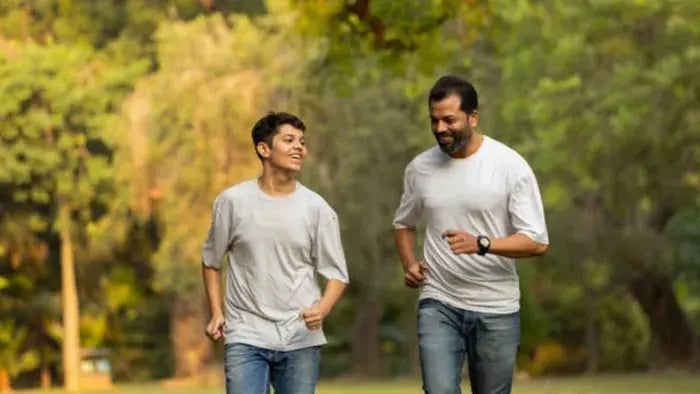- Eat Nutritious Meals
- Get Quality Sleep
- Be Physically Active Every Day
- Take Breaks and Rest Your Mind
- Limit Screen Time and Practice Digital Balance
- Practice Daily Mindfulness or Relaxation
Introduction

School life is full of exciting opportunities and daily challenges. Between long hours of classes, exam prep, friendships, and extracurriculars, your schedule can feel packed. In the middle of all this, it's easy to forget about your health. But your energy, focus, and emotional well-being depend on more than just study habits, they rely on the small daily choices you make for your body and mind. Developing healthy routines during school years creates a strong foundation for success both now and in the future.
Staying fit doesn’t mean following a strict or complex plan. It’s about building simple, manageable habits that fit easily into your lifestyle, eating nutritious food, being active, getting quality sleep, managing screen time, and caring for your emotions. These small habits work together to help you feel calm, stay focused, bounce back from tough days, and enjoy school life with more confidence.
When your body and mind are in sync, it’s easier to learn, solve problems, build good relationships, and stay positive. Every student, whether in primary school or preparing for exams, can benefit from practical health habits that bring more balance into daily life. Making time for wellness doesn’t take away from your studies; it helps you perform better and feel better in every part of your day.
6 Health Tips for Students: Simple Habits for a Balanced Life

Student life is a time of learning, growth, and exploration, but it also comes with pressure. Whether it’s academic stress, digital overload, or long study hours, your physical and mental health can take a hit. The good news is that you don’t have to do everything perfectly. Small, consistent steps toward healthy habits can help you feel more focused, calm, and in control. Let’s look at some essential practices that support both learning and well-being.
Eat Nutritious Meals
Food is not just for satisfying hunger, it’s the fuel your brain needs to learn and grow. According to the Dietary Guidelines for Indians,a fulfilling plate should include whole grains, fresh vegetables, fruits, protein, and healthy fats. Begin your day with energy-rich meals like upma, poha, or fruit with curd. Avoid skipping meals or relying heavily on chips and packaged snacks. Nutritious meals support better focus, stable moods, and lasting energy during school hours and homework time.
Get Quality Sleep
As per a study published in the National Institute of Neurological Disorders and Stroke, sleep is essential for memory, attention, and emotional balance. Students need about 8–10 hours of sleep each night. Going to bed and waking up at the same time daily helps regulate your body’s clock. Limit screen time before bedtime and create a peaceful sleep space. When you’re well-rested, your focus sharpens, and your mood stays steady throughout the day.
Be Physically Active Every Day
Staying active doesn’t mean regular gym sessions, even a short walk, cycling, dancing, or a yoga session can improve your energy and mood. A 2023 study in Cureus shows that daily physical activity reduces stress, improves attention, and boosts emotional resilience. Aim for at least 30 minutes of movement daily. It keeps your immune system strong and helps you handle daily challenges more confidently.
Take Breaks and Rest Your Mind
Studying without breaks can make you feel tired and less productive. Use the 25:5 rule, study for 25 minutes and rest for 5. These breaks are not wasted time. Stretch, take a few deep breaths, or step outside for a minute. A 2023 study published in Healthcare (Basel) supports that taking mindful breaks helps improve mental performance and reduces burnout. Breaks help your brain absorb information and stay fresh longer.
Limit Screen Time and Practice Digital Balance
Too much screen time, especially without breaks, can strain your eyes, affect sleep, and lead to poor posture. According to a 2023 study in J Educ Health Promot, managing screen use is crucial for students. Take a break every 20 minutes, use screens in good lighting, and avoid gadgets 30 minutes before sleep. Replace some screen time with activities like reading, art, or outdoor play. Balance helps you feel more present and energetic.
Practice Daily Mindfulness or Relaxation
Mindfulness is about being aware of the present moment without judgment. Whether through deep breathing, quiet reflection, or journaling, these small moments teach you to manage emotions and reduce anxiety. A study from Treasure Island, 2025 shows that mindfulness improves emotional regulation and focus. Just 5–10 minutes a day can help you feel calmer, more centered, and better able to tackle school challenges.
Conclusion

Building healthy habits as a student isn’t about doing everything perfectly — it’s about making small, consistent choices that support your well-being. From eating balanced meals and staying active to getting enough rest and managing screen time, each habit plays a role in helping you feel your best. These simple practices not only improve your focus and energy today but also lay the groundwork for a balanced, happy, and productive future. By taking care of your body and mind now, you’re creating a lifestyle that will help you grow stronger, smarter, and more confident every day.
Her love for storytelling began with reading her grandfather’s speeches, where Tarishi saw the power of words in creating lasting memories. Combining her passions for food and writing, she has turned her life into a fulfilling path of sharing stories that celebrate flavours and how food brings communities together.
The views expressed are that of the expert alone.
The information provided in this content is for informational purposes only and should not be considered a substitute for professional medical advice, diagnosis, or treatment. Always seek the advice of your physician or another qualified healthcare provider before making any significant changes to your diet, exercise, or medication routines.
References
https://www.ncbi.nlm.nih.gov/books/NBK513238/
https://pmc.ncbi.nlm.nih.gov/articles/PMC10852174/
https://pmc.ncbi.nlm.nih.gov/articles/PMC10298359/
https://pmc.ncbi.nlm.nih.gov/articles/PMC9902068/
https://www.nin.res.in/dietaryguidelines/pdfjs/locale/DGI07052024P.pdf
















